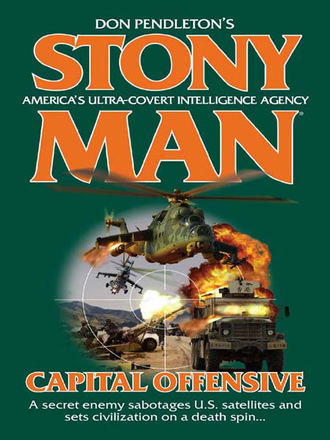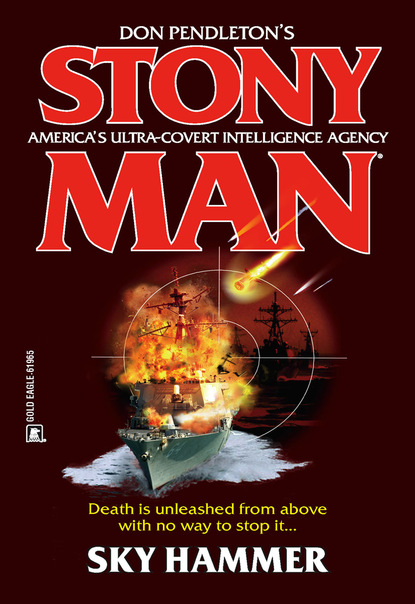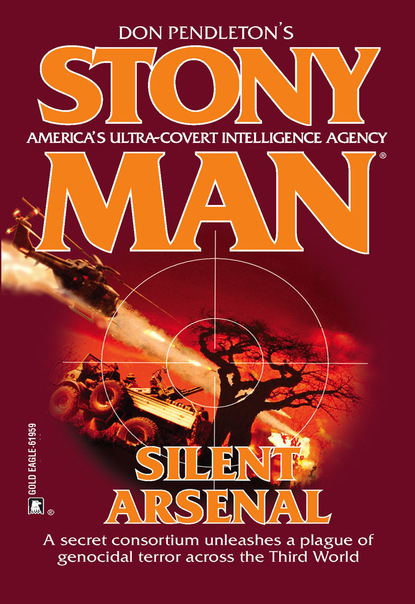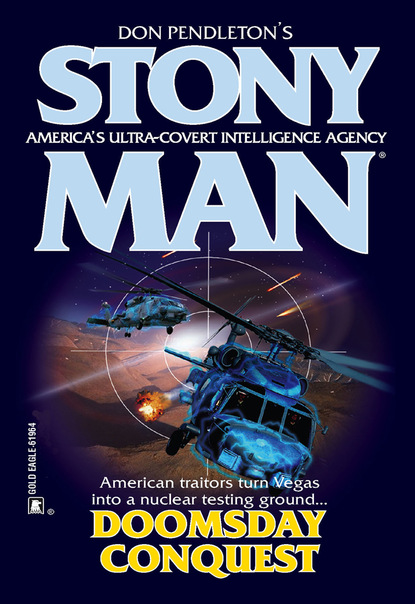
Полная версия
Capital Offensive

Capital Offensive
Don Pendleton
STONY MAN ®
AMERICA’S ULTRA-COVERT INTELLIGENCE AGENCY

Special thanks and acknowledgment to
Nick Pollotta for his contribution to this work.
CONTENTS
PROLOGUE
CHAPTER ONE
CHAPTER TWO
CHAPTER THREE
CHAPTER FOUR
CHAPTER FIVE
CHAPTER SIX
CHAPTER SEVEN
CHAPTER EIGHT
CHAPTER NINE
CHAPTER TEN
CHAPTER ELEVEN
CHAPTER TWELVE
CHAPTER THIRTEEN
CHAPTER FOURTEEN
CHAPTER FIFTEEN
CHAPTER SIXTEEN
CHAPTER SEVENTEEN
CHAPTER EIGHTEEN
CHAPTER NINETEEN
CHAPTER TWENTY
CHAPTER TWENTY-ONE
CHAPTER TWENTY-TWO
CHAPTER TWENTY-THREE
EPILOGUE
PROLOGUE
Sonora, Texas
Loose gravel crunched under the tanker truck’s tires as it slowly rolled out of the darkness.
“Hold it right there!” the guard called out, raising a palm. With a stern expression, the big man stood at the entrance to the brick kiosk. “Right there, I said!”
With hissing air brakes, the massive vehicle rocked slightly as it came to a complete stop directly in front of the locked gate of the electrified fence. Coiled lengths of razor-sharp concertina wire along its top glistened in the reflected glow of the headlights.
On the side of the tanker was the name and logo of a famous fuel company, but the guard knew that was probably false. Everything short of an ice-cream truck had delivered materials to the desert warehouse. After working there for a year, nothing surprised the man anymore. Although dressed in civilian clothing, the U.S. Marine corporal was wearing a canvas military gun belt with a .45 Desert Eagle pistol at his hip.
Keeping a hand near his weapon, the Marine could see there were two people inside the cab, a big man sitting behind the wheel and a woman resting her head against the passenger-side window. The raven-haired beauty appeared to be sound asleep; he could hear her softly snoring.
Cautiously loosening the Desert Eagle, the corporal cast a wary glance at the delivery schedule tacked to a corkboard inside the brick kiosk and saw there wasn’t a shipment due to the government warehouse for another couple of days. That wasn’t unprecedented. Set behind the electrified fence, the massive Quonset hut that served as a warehouse was little more than a junkyard for spare parts and obsolete equipment. Whenever anything got upgraded, or outright replaced, the old equipment was sent here, to be labeled, numbered, indexed, stacked, listed and forgotten. There wasn’t anything inside the warehouse worth stealing unless a person was looking for antiques. Everybody in his platoon considered standing guard here a punishment detail. Death by boredom. Although exactly who it was the soldier had annoyed he honestly had no idea.
“You folks lost?” the corporal asked, smiling politely. His relief had told him how a bunch of folks with cameras had stopped by once foolishly thinking this was the entrance to the famous Sonora Crystal Caves. It took him a full hour to convince the civilians that this was just a warehouse and not a tourist attraction. Civilians, he thought, were just about as useless as lips on a brick.
“Nope, not lost. Got a priority delivery,” the driver said, flipping down the visor and pulling loose a sheath of papers held in place by a rubber band.
The corporal tensed at the action. But the driver stayed inside the cab and held the papers outside the window.
“A delivery at this hour?” the corporal asked suspiciously, slightly easing his stance.
The driver shrugged. “Hey, I just work here, brother.”
A fellow Marine, eh? The corporal smiled. “I hear that.” Accepting the papers, he quickly checked the documents and everything seemed to be in order. Just another load of miscellaneous equipment for the junkyard.
Tucking the papers into the pocket of his shirt, the corporal grabbed the stanchions supporting the sideview mirror and pulled himself onto the corrugated steel step and looked inside the cab. He didn’t want to, but regulations were regulations, even out here in the middle of nowhere.
The driver raised both hands to show he was unarmed, and the corporal gasped at the sight of the sleeping female passenger. The buttons on her blouse were undone, the full breasts naked and exposed. One of the nipples was pierced, the steel ring glistening in the amber dashboard lights like gold.
“Okay, you’re going on report, asshole,” the corporal growled unhappily. “Bringing a goddamn hooker on a delivery run—” Suddenly he stopped talking and grabbed his throat with both hands, red blood gushing between his fingers.
Falling away from the truck, the Marine hit the ground hard, his head cracking against the pavement. Everything whirled for a moment, then he heard the door to the truck open. The corporal clawed for the Desert Eagle at his hip. As the gun cleared the holster, it was kicked from his grip and skittered away into the darkness. Then the driver knelt to stab him in the chest with what appeared to be a long sliver of glass wrapped in thick cloth.
The pain triggered adrenaline and the corporal savagely swung up an elbow to knock the makeshift knife aside, then he rolled over to frantically scramble for the kiosk. Gotta make it…only a few yards, he thought. There were more weapons inside a locked cabinet near the minifridge along with a full medical kit. But more importantly, there was the alarm button on the desk. The telephone was useless; talking would be impossible with his vocal cords cut. With that realization, a wave of cold flooded the corporal, and he knew this wasn’t some thrill-crazy lunatic, but a planned attack on a military site. Suddenly getting another pistol was replaced by the grim determination to hit the alarm button.
Stumbling into the kiosk, the corporal could see the alarm. But a heavy feeling was filling his body, and breathing was impossible, his chest aching from the need to pull in one more sip of air. Releasing the hand from his throat, the soldier saw crimson blood arch into the kiosk and instantly knew that a major artery had been cut with the first expert slash. Death was close. He had only a few seconds remaining. Summoning his last vestiges of strength, the corporal staggered toward the alarm button…but something pulled on his collar, hauling him back into the deadly night.
Tumbling to the hard ground, the dying soldier vaguely saw the grinning truck driver standing over him for a single moment, then the glass knife came down, stabbing into him again and again. Searing agony filled his universe, to be replaced with a soothing blackness that engulfed the Marine forever.
Standing erect, the frowning driver cast aside the glass knife and it shattered on the concrete steps to the small kiosk. “Sorry, brother,” the big man muttered in guttural Spanish.
“Was he alone?” Lieutenant Henrietta Caramico demanded, leaning out of the cab of the truck, a silenced 9 mm Bersa pistol held expertly in her hand. The woman’s shirt was still undone, her breasts swaying to the subtle vibrations of the big diesel engine.
“Yes, Lieutenant. There’s nobody else listed on the duty roster,” Sergeant Roberto Mendoza replied, squinting at the papers tacked to the corkboard above the desk.
“Good,” Caramico muttered, her weapon sweeping the darkness for any video cameras. But the area was clean. Once again, she thought, Snake Eater had been right. Security here had been a joke. But then, the Americans didn’t consider this isolated warehouse a chink in their national defense. Major mistake.
“Okay, let’s finish this,” the lieutenant snapped, swinging back into the cab. Holstering the gun, she began to hurriedly button her shirt closed.
Climbing behind the wheel, the sergeant revved the engine to build power and then shifted gears and charged for the wire gate. Sparks flew as the hinges were ripped away from the supporting steel posts and the gate crashed loudly to the pavement. Buckling the metal framework under its massive rubber tires, the heavy tanker rolled over the ruined gate and across the empty parking lot, steadily building speed.
“Zigzag a little,” Caramico ordered, tucking the shirt into her pants. “Remember, we’re supposed to be a runaway truck.”
Nodding, the big sergeant did as requested and began to move erratically. He sideswiped a battered old VW Beetle, probably the car of the dead guard, then stomped the gas pedal to the floor and shifted gears. The speedometer just managed to reach forty miles per hour when the truck violently slammed into the Quonset hut. A headlight shattered and the tanker severely dented the corrugated steel siding. Braced for the collision, the man and woman were still almost thrown from their seats.
Allowing the engine to sputter and stall, the sergeant clamored out of the cab and went around to the rear of the tanker. The lieutenant was already there, smiling widely. Gasoline was rushing out of a break in the main feeder pipe, exactly where they had weakened the metal with acid only a few minutes earlier.
“Take care of our guest,” Caramico said, walking briskly into the darkness.
Hunching his shoulder, Mendoza grunted. “Yes, ma’am.” Climbing into the sleeper compartment situated behind the cab, the sergeant dragged out a corpse and stuffed the owner of the tanker carefully behind the steering wheel. When the position looked natural, Mendoza liberally poured whiskey over the body and tossed the empty bottle to the floor mat. It had been easy enough for the pretty lieutenant to strike up a conversation with the driver at the truck stop on the main road, then convince him to have a couple of sips of whiskey to put a trace of alcohol into his bloodstream. Caramico was a cast-iron bitch, but even Mendoza had to admit that his lieutenant was a real looker. The two had had sex in the sleeper compartment, and when the man was snoring afterward, she’d used a hypodermic needle to inject a bubble of air into his bloodstream. Death was almost instantaneous, but would be totally untraceable to modern-day forensics.
“All clear,” Caramico reported, walking out of the gloom. “I dropped a few clues for the FBI to find tomorrow. Help them discover the identity of the terrorists, eh?”
“I dislike that word.” Mendoza stepped away from the expanding puddle of fuel on the cracked ground. The rising fumes were starting to blur the air, and the reek was becoming intolerable. “We’re soldiers, not criminals.”
“And this is war,” Caramico replied, retreating a few yards herself. “So shut the fuck up, and just do your job.”
Biting back a response, the big sergeant opened and closed his scarred hands, but said nothing.
Lighting a cigarette, the lieutenant drew in the smoke with obvious satisfaction. Then she slowly exhaled and tossed the cigarette onto a crack in the dry pavement. The glowing tip resembled the eye of a demon in the shadow of the crashed truck. Splashing from the broken pip, the dark pool of gasoline was rapidly spreading across the parking lot, following the sandy cracks to head directly for the burning cigarette.
“How long do we have?” Mendoza asked nervously, licking dry lips. The man preferred timing pencils and fuses. Solid, reliable military hardware, not this makeshift nonsense. But subterfuge was what the general wanted. And orders were orders.
“Less than a minute,” Caramico said slowly, estimating the expansion of the gasoline pool. The fuel seemed to be pouring out of the tanker faster than ever. Perhaps the minor crash had burst some of the internal seals.
In unison, the two soldiers broke into a run and were moving at a full sprint when they passed through the smashed gate and raced past the bloody corpse near the kiosk. A flickering light appeared from behind. Redoubling their speed, the man and woman frantically pelted into the desert and managed to dodge behind a large sand dune a split second before the ruptured gasoline tanker violently detonated.
Fiery light filled the night, and the very ground shook from the staggering force of the blast, the strident explosion rumbling across the flat Texas desert for countless miles. A heartbeat later, flaming debris sprayed across the desert, the sand dune shaking from the brutal impact on the other side.
Long moments passed before the force of the detonation dissipated. Brushing loose sand from their hair and clothing, the man and woman went around another sand dune and reclaimed the motorcycles they had parked there earlier that day.
Kicking their sleek bikes alive, Caramico and Mendoza paused for a moment to look to the north. Precisely on schedule, three bright pinpoints appeared above the mountains on the horizon.
“And so it begins,” Mendoza remarked, his face a blank mask of control.
“No, this is how it all ends,” Caramico corrected harshly, her eyes alive with pleasure.
Already moving at Mach Two, twice the speed of sound, a trio of experimental missiles streaked high in the evening sky, steadily moving away from one another as the war machines headed for scattered targets halfway around the world. Then, incredibly, they seemed to pause and rotate slightly to proceed in radical new directions.
CHAPTER ONE
Washington, D.C.
Dawn was just breaking over the capital city, and the White House, normally a beehive of activity at that early hour, was strangely quiet. Government aides rushed about without talking, telephone conversations were hushed and the Secret Service agents stationed at every door were grimly silent, their hard eyes constantly checking every identification badge. There were absolutely no tourists or news reporters anywhere in sight.
To the stoic people inside the Oval Office, the atmosphere was cool in both temperature and demeanor. The anxious members of the senior staff were perched on the two couches set in front of the fireplace, looking as if they were racehorses poised at the starting gate. Across the room, the President was sitting behind a massive hardwood desk, his fist clenched around a red telephone receiver. Ten years ago that would have been the hotline to Moscow. Now the secure line went directly to Beijing.
Openly cradling assault rifles, Secret Service agents stood in every corner, barely a ripple in their jackets from the body armor underneath. Outside the tall windows, armed helicopter gunships swept low around the capital building in a standard defensive pattern, then there came the low rumble of a full squadron of jet fighters streaking across the city. Through the glass panes of the door leading to the promenade, Marine One could be seen sitting on the manicured lawn between the Jefferson Mounds, the turbo props of the armored helicopter slowly turning as it stayed ready to fly the President to safety at a moment’s notice.
The members of the senior staff knew that the vice president was already in the underground bunker at Camp David, and the Joint Chiefs were en route to Cheyenne Mountain, the headquarters for NORAD.
“No, Mr. Premier, the United States of America is not, repeat, not at war with China, or with anybody else for that matter,” the President said in strained patience. The man’s hair was tousled and his necktie was askew, as if he hadn’t been to sleep in days. Yet he had only been awake for a few hours.
“Yes, I agree,” the President continued after a short pause. “We do have to keep the incident from the general public…. Yes, rioting in the streets is a distinct possibility, I agree.”
Frowning slightly, the President listened to the man on the other end of the receiver as he wearily poured himself a fresh cup of coffee from a steaming urn.
“No, that is not quite correct, Mr. Premier…. Look, Lu-Chan, I have absolutely no explanation about the missile misfiring.” The President leaned back in his chair with a white china cup balanced in his hand. “We did help you shoot them down, after all. A dozen of our new ICBMs went wild, but we were able to self-destruct nine. Only three got away from us, and all of them were destroyed in-flight. We suspect a computer malfunction…. Yes, I agree, Lu-Chan. Machines are useful servants, but very poor masters.”
The senior staff looked up sharply at the colossal lie, but said nothing. Nine missiles? Only three of the new ICBMs had been launched the previous night. But the careful distortion of the truth made the U.S. seem heroic and less like incompetent fools.
“I understand that hundreds of Chinese civilians were killed when the missiles came crashing down on that factory complex,” the President stated, setting down the untouched cup. His voice was calm, but the tendons in his neck revealed the tension he was actually feeling. Red China was the last serious enemy to freedom in the world, but the gigantic nation was slowly becoming a valuable business partner with America. Soon enough, Communist China would crumble under the economic pressure to buy washing machines, DVD players and tractors, exactly as the Soviet Union had done several years ago. However, at the moment, the Chinese were still the only nation truly capable of nuking America off the map and their overly suspicious commander had to be treated with all due respect.
“This would have been much worse if the warheads hadn’t been dummies,” the President said, then abruptly stopped. There was an awkward pause. “Nonnuclear models,” he explained patiently.
The Premier of Red China boasted of his excellent English and considered it a mark of distinction that he didn’t need a translator like the American President. However, American slang sometimes confused the man terribly.
“I agree…we…yes, thank you, Lu-Chan.” The President sighed deeply, his muscles finally relaxing. “I only wish that if the situation were reversed, I could also show such wisdom and restraint as yourself, my old friend…. Yes, absolutely. We shall talk again on this soon. Goodbye.” Gently, the exhausted man hung up the red phone as if it were made of glass and a hurried gesture would shatter it into a million pieces.
“Well, sir?” Daniel Thursby nervously asked, wringing his hands. The senior domestic policy adviser had recently shaved and was neatly dressed. He looked almost too young to work in the government, yet in the halls of Congress, he was one of the most feared men in the nation.
“China has agreed to step down from Red Flag Five, their version of DefCon Five, and will no longer be preparing to launch missiles at us,” the President stated, taking a sip from the tepid cup of coffee.
With audible sighs, everybody in the room eased their stance at the good news.
“Even if they did, sir, we could have stopped their missiles,” Virgil McPherson stated confidently. Wearing a badly rumpled suit, the foreign policy adviser looked perpetually angry.
“All of them?” the President demanded pointedly, placing aside the empty cup.
“Greater than ninety-five percent.”
The President tried not to frown. Which would mean only twenty or thirty million dead civilians.
“What was the breakage, sir?” Brent Morgan, the head of Homeland Security asked, easing his grip on a black cell phone. The entire White House was shielded against radio signals, but cell phones could be used inside the structure for relaying commands to staff while on the move.
“The estimated death toll is five thousand men, women and children,” the President replied sternly, his displeasure at the cavalier euphemism patently obvious. “Although I’m sure that a lot of things—” he stressed the word “—were also smashed and destroyed. Our ambassador in Beijing will be receiving a bill within the day for the damages. Massively overinflated I’m sure, but we’ll have to pay without complaining to maintain international goodwill.”
“The one bright spot is that the Paris missile impacted on an empty apartment complex set to open next month,” George Calvert, the secretary of the interior added, throwing his arms wide across the back of the sofa. “Not a soul was hurt. But the blaze from the crash spread to a nearby park and started a damn forest fire. The blaze is out of control and heading for civilian areas and oil refineries.”
“Can we help?” Morgan asked. “Send some humanitarian assistance, try to earn some goodwill?”
Waving a dismissal, the other man snorted. “Hell, no! The Red Cross has already sent in disaster relief,” he replied. “NATO, as well. But all American assistance has been flatly refused. The French are beyond furious, and are squealing like stuck pigs.”
“Can we put any spin on this?” Thursby asked without much hope.
“Not a chance,” Amanda Freeman said, shaking her head. The press secretary was wearing a neatly tailored dress suit sans jewelry. She wore polish, but the nails were kept short from her constant work on computers. “We have to take this hit politically.” She frowned. “The Internet is burning with the tale, the bloggers are going nuts and the news cycle has already sunk its teeth into the story. The whole world thinks that we had a massive failure in our missile defense systems. We look like damn idiots, but at least nobody thinks we tried to start World War Three and failed miserably. Good thing the last missile hit the ocean.”
Which was a lot better than letting them know the truth, the President added mentally. The stealth capabilities of those missiles was being tested, not their accuracy. They should have been able to hit a phone booth on the other side of the globe! The very idea that three of them failed at the same time was beyond ludicrous.
“How are things at the United Nations?” Virgil McPherson asked pointedly. “I understand the Security Council has called a special meeting just to discuss limiting our—”
There was a knock at the door, then it opened and the President’s secretary appeared. “Sir, the sandwiches have arrived,” the elderly woman said quietly.
The dour expression on the President’s face eased somewhat at the news. “Excellent. Send them right in.”
“Yes, sir,” the secretary replied. She left the Oval Office at a brisk walk.
“Sandwiches?” asked the senior policy adviser, glancing at the sideboard along the wall. It was stacked with enough food to feed a platoon of Marines for a week.
“Ladies and gentlemen, I want to thank you all for your diligent efforts,” the President said, sitting straighter in his chair. “But now I need a few minutes alone to consider the matter.”
“Leave? With so much on the table?” a junior speech writer asked in surprise, looking up from his laptop.
“Yes, thank you,” the President said with a touch of impatience in his voice. “I’ll confer with you again in an hour. Good day.”
“Of course, sir, absolutely,” Calvert said, rising from the couch. He shot the younger man a disapproving look. “We’ll be in the Blue Room with the Cabinet discussing the matter.”
Gathering their reports and files, the senior policy staff left the office, with the Secret Service agents following close behind. They also knew the difference between the President wanting to be alone and when he needed privacy.
When the office was empty, the President pressed a button on the intercom. Immediately the door opened and in walked Hal Brognola. Short, powerful, middle-aged, he looked like a Mafia capo or the CEO of a multinational corporation, instead of the director of the Sensitive Operations Group.
“By God, I have never wanted to see you less, but needed you more, old friend,” the President said, standing and offering a hand.












